Complete Beginners Guide to Vrbo

With 17.5 million visitors and 15 million app downloads last year Vrbo is really taking off. If you want a slice of the pie, find out how to make the most of your Vrbo listing with this complete beginner's guide to Vrbo.
A Little Background on Vrbo
Founded in 1995, Vrbo has carved out a niche in the vacation rental market by focusing exclusively on entire homes, offering families and groups a way to experience travel that's as comfortable as it is memorable.
Unlike platforms that mix room rentals and whole properties, Vrbo connects property owners directly with families and groups seeking the space, privacy and amenities that only a whole home can offer.
Vrbo Vs. Airbnb - Key Hosting Differences
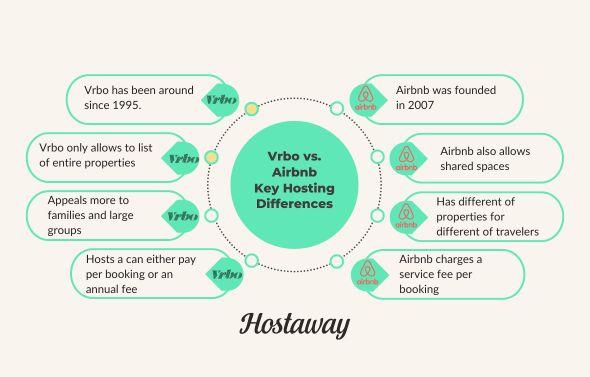
Vrbo (Vacation Rentals by Owner) has been around since 1995, making it one of the earliest players in the vacation rental market.
One of the key differences between both platforms is that Vrbo only allows the listing of entire properties rather than shared spaces (Airbnb), Vrbo offers a more private, home-away-from-home experience, which appeals to mostly families and larger groups.
Another key difference is that Airbnb charges a service fee per booking while Vrbo gives their hosts a choice to either pay per booking or an annual fee (more later).
Listing your property on Vrbo also offers a significant benefit, it automatically gains visibility across all of Vrbo's affiliated platforms like Expedia, Trivago and KAYAK, substantially increasing its exposure to potential guests.
Vrbo Host Requirements
Before getting into the specifics of listing on Vrbo, it's important to ensure you comply with your local vacation rental regulations. As a first step, take some time to familiarize yourself with the legislation in your area, as Vrbo requires all hosts to adhere to these rules. Some common regulations are:
HOA rules and bans
Licensing and registration requirements
Zoning ordinances
Other regulations on building safety and health codes, parking and liability insurance
Listing requirements on Vrbo
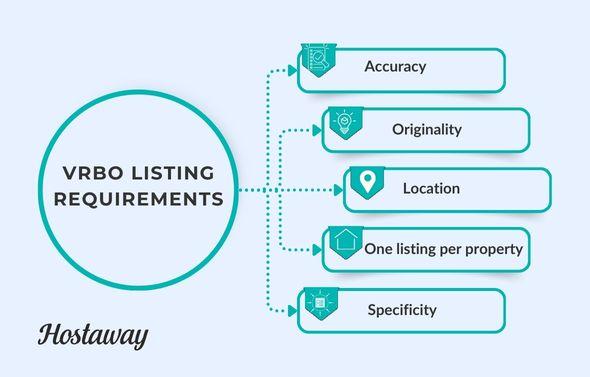
To be able to list on the platform successfully, Vrbo requires:
Accuracy: Craft a genuine and accurate depiction of your rental property
Originality: Come up with your own content you will not be able to copy and paste information from other listings
Location: Specify the precise location of your property.
One listing per property: Each property is only allowed one listing. (You won't be able to create multiple listings for one property to boost visibility).
Specificity: Your property listing must describe only the advertised unit — don't describe additional units in the same listing.
Vrbo photo requirements - The dos and don'ts
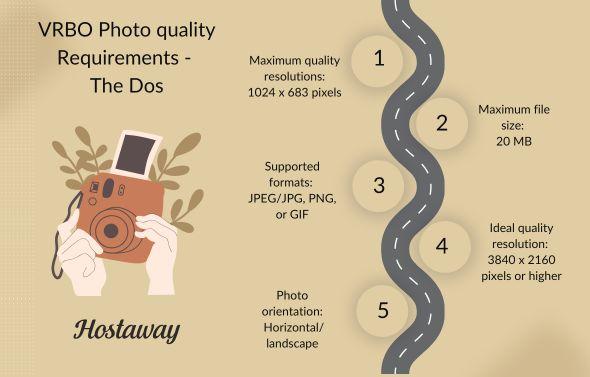
Incorporating high-quality photos into your Vrbo listing is crucial for your success, allowing you to highlight your property's unique features and giving guests a clear preview of what they can expect.
On Vrbo, your first photo needs to be your best — it's crucial for attracting potential guests. High-quality, well-staged, professional photos can make or break a listing.
Consider enhancing your listing with virtual tours, allowing potential guests to explore your property online before booking. This immersive experience can help set your rental apart and attract more confident, committed travelers.
Other photo requirements:
Number of photographs: There must be at least 6 photographs at all times in your listing.
Exterior photographs: For multi-unit properties such as apartments, your photos must include at least one building exterior photo, one interior/lobby photo, three guest room photos and one bathroom photo.
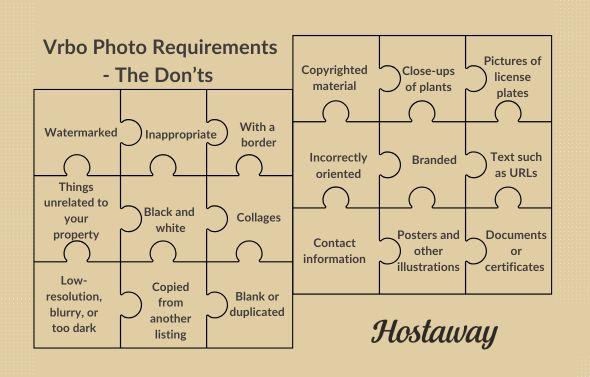
Vrbo's age requirement for hosts
Although Vrbo doesn't explicitly impose an age requirement to become a host, you must be at least 18 years old to create an account, according to Vrbo's Host Terms of Service. It's likely that most individuals interested in hosting on Vrbo already meet this age criterion.
Safety Requirements for Your Vrbo Listing
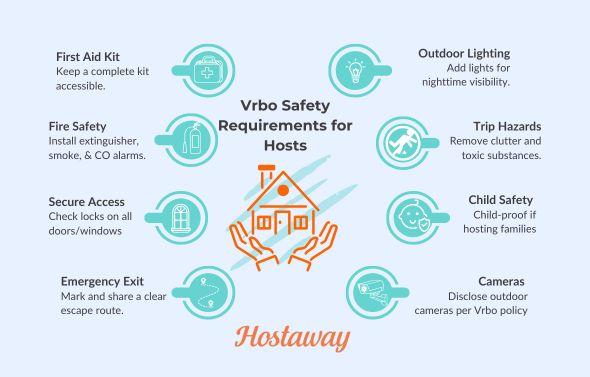
Keeping your guests safe isn’t just thoughtful — it’s essential for being a responsible host on Vrbo. Here’s what you should have in place to meet Vrbo’s safety expectations and create a secure environment for everyone:
Stock a complete first aid kit and place it somewhere guests can easily find in case of emergencies.
Install fire safety equipment, including a working fire extinguisher, smoke alarms, and carbon monoxide detectors.
Check all doors and windows to ensure they lock properly—and inspect them regularly for peace of mind.
Create a clear emergency exit route and communicate it to your guests, either in person or in your welcome guide.
Add exterior lighting to help guests safely navigate your property at night.
Eliminate tripping hazards and remove or safely store any toxic substances that could pose a risk.
Child-proof your space if you’re targeting families—cover outlets, secure furniture, and lock away harmful items.
Follow Vrbo’s surveillance policy if you have outdoor security cameras. Be transparent with guests and disclose their presence in your listing.
Creating a Vrbo Profile - A Step-by-Step Guide

Before you dive into creating and optimizing your listing, you'll need to set up a free Vrbo account. Once you have your Vrbo owner login, you can start listing your vacation rental properties for travelers to discover and book. Let's look at how to create a profile on Vrbo. Setting up a Vrbo host account is easy. Just follow these steps:
Go to the official Vrbo website and click on “List your property” at the top of the page.
Enter your property details, including size and address.
Provide your name, email and create a password. You'll then get an estimate of your potential earnings.
Click “Continue”.
Confirm your property's location.
Upload photos of your property.
Complete the required security information.
Set up your payment methods.
Determine and list your rental rate.
Publish your listing to start booking guests.
How to Create a Listing on Vrbo?
Although it's free to list on Vrbo, the secret to success hinges on crafting your listing description to appeal to the right guests. Go the extra mile and write a description that tells a story that will appeal to your target audience.
A well-composed listing not only highlights your property's best features but also helps it distinguish itself in a global marketplace teeming with millions of listings. Here's how to list a property on Vrbo:
Create a listing on Vrbo in 5 easy steps
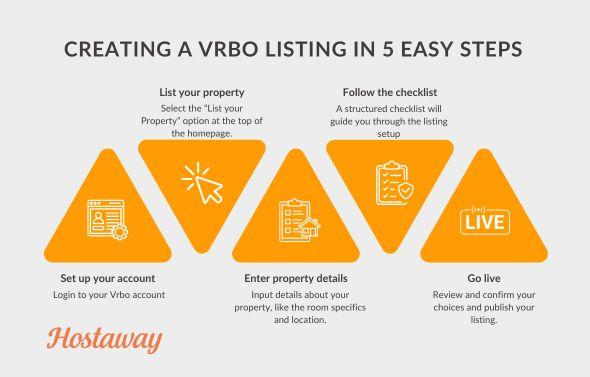
Account setup: Start by logging in to your existing account or create a new one on Vrbo.
List your property: Select the “List your Property” option at the top of the homepage.
Enter details: Input details about your property, such as room specifics and location, to gauge your potential earnings. Click “Next” once you've filled out this information.
Follow the checklist: A detailed checklist will assist you in setting up your listing. Make sure to thoroughly complete each section:
Details: Provide a comprehensive description of your property including house rules, cancellation policy, check-in details, etc.
Photos: Upload high-quality images that best represent your short-term rentals.
Security: Set up security measures as recommended by Vrbo.
Payment: Choose your preferred payment method and enter the preferred bank account details to receive earnings.
Pricing: Define your pricing structure.
5. Go live: Once you've reviewed and confirmed your choices, publish your listing by clicking “Go live.”
How to Optimize Your Listing on Vrbo
Improving your position in Vrbo search results is an effective strategy to boost your revenue. Vrbo's search engine is designed to help travelers easily find what they need, so it's important to consider your target guests when optimizing your listing.
Reflect on the type of traveler you want to attract and their search preferences. Every effort you make to entice guests to book your property can positively impact your search rankings.
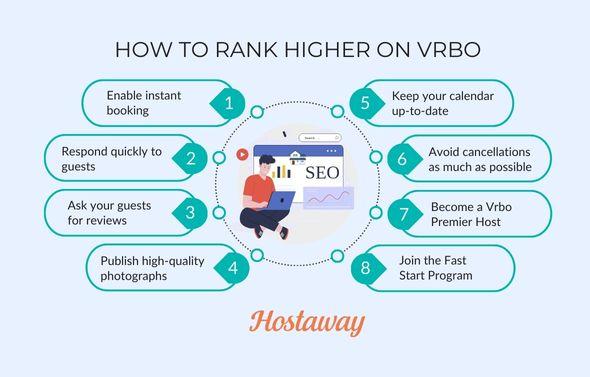
Ranking higher on Vrbo
1. Enable instant booking
Allow your guests to book your rental instantly without having to wait for a response. According to Vrbo, listings that offer instant booking rank higher than those without this feature. Pair this with the fact that 72% of guests prefer to book instantly online and it's a total no-brainer.
Note: If your property is listed on other OTAs make sure to sync calendars to avoid double bookings.
2. Respond quickly to guests
Your Vrbo listing's quality score is heavily influenced by how quickly you respond to guest inquiries. While Vrbo recommends responding within 24 hours, faster replies (ideally within a few hours) can significantly boost both guest satisfaction and your listing score.
Consider using vacation rental software to automate responses, streamlining your workload while improving the guest experience and enhancing your Vrbo performance.
3. Ask your guests for reviews
High ratings push your listing to the top of Vrbo search results and they're the first thing potential guests notice. Encourage every guest to leave a review to build your score and reach five-star status.
Your average rating is based on all reviews, so aim for at least 4.75 stars to display five stars on your profile.
4. Publish high-quality photographs
On Vrbo, your first photo needs to be your best — it's crucial for attracting potential guests. High-quality, well-staged, professional photos can make or break a listing.
Vrbo allows up to 50 photos per listing, so make sure to showcase your property with recent, clear images. And remember to follow Vrbo's photo guidelines (highlighted above) for the best results.
5. Keep your calendar up-to-date
Nothing frustrates travelers more than attempting to book a property, only to find the calendar hasn't been updated and it's already fully booked. Keeping your availability up to date not only ensures more bookings but also helps maintain your listing's quality.
Additionally, if you don't update your calendar at least every 60 days, Vrbo will stop displaying it on your listing. To maximize visibility, we recommend updating it in real-time via a channel manager like Hostaway.
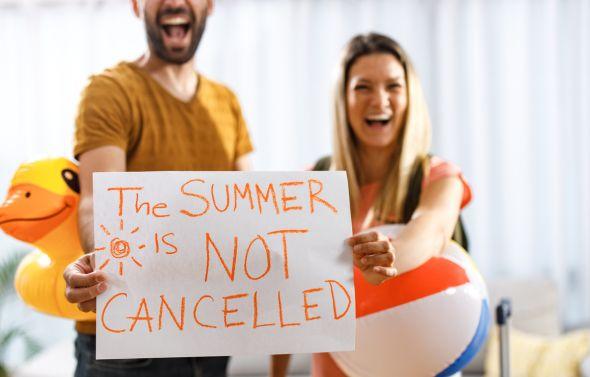
6. Avoid cancellations as much as possible
Online Travel Agencies (OTAs) take host cancellations seriously, often more so than guest cancellations, even when hosts have valid reasons. A high cancellation rate can listing's quality score and lower your visibility in search results, making it less likely for guests to discover and book your property.
Read our article VRBO Cancellation Policies | The Ultimate Guide for everything you need to know about setting cancellation policies on your Vrbo listings.
7. Become a Vrbo Premier Host
Vrbo's Premier Host program rewards outstanding hosts similarly to Airbnb's Superhost program. As a Premier Host, you'll gain access to the Boost program, which temporarily enhances your listing's visibility over competitors. Each time a guest checks out, you'll earn a “Boost” to elevate your listing's rank higher than it normally would, giving you an advantage on the platform.
8. Join the Fast Start Program
Getting off the ground as a new host can be challenging, which is why Vrbo introduced the Fast Start program. This initiative is tailored to help new hosts expand their presence on the platform.
By joining the Fast Start program, you'll benefit from increased visibility and Vrbo even allows you to import your existing reviews from other platforms like Airbnb or Google My Business. Leveraging this opportunity could quickly elevate you to Premier Host status.
Everything You Need to Know About Vrbo Host Fees
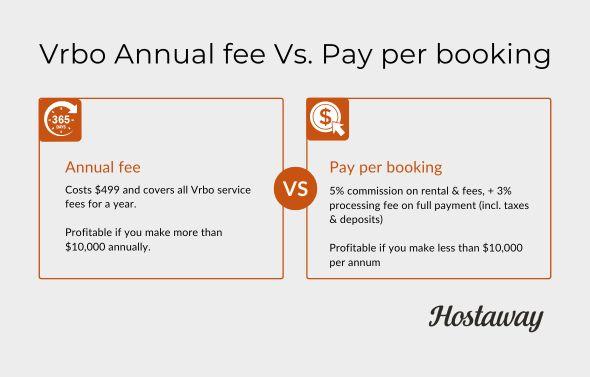
Vrbo offers two fee structures for owners: the pay-per-booking fee and the annual subscription fee. Let's take a look at each of these options.
Pay-per-booking fee
This option includes a 5% commission on the rental amount and any additional fees charged to the traveler, plus a 3% processing fee on the total payment received, including taxes and refundable damage deposits. This offers flexibility, allowing hosts to pay fees only when they receive bookings.
Annual fee
The annual subscription costs $499 and covers all service fees for the year. This flat rate simplifies financial planning, as it eliminates per-booking charges and includes additional features like international site listings, access to Reservation Manager, 50 HD photos, an interactive map and a reservation calendar, enhancing property management efficiency.
Which fee is the better choice?
The optimal Vrbo fee structure depends on your rental's booking frequency and revenue. If your property is booked for less than six weeks per year or earns less than $10,000 annually, the pay-per-booking option is more advantageous, as you only pay fees on bookings made.
Conversely, if your rental is frequently booked or earns over $10,000, the annual fee, which covers unlimited bookings for a flat rate, is likely the better choice.
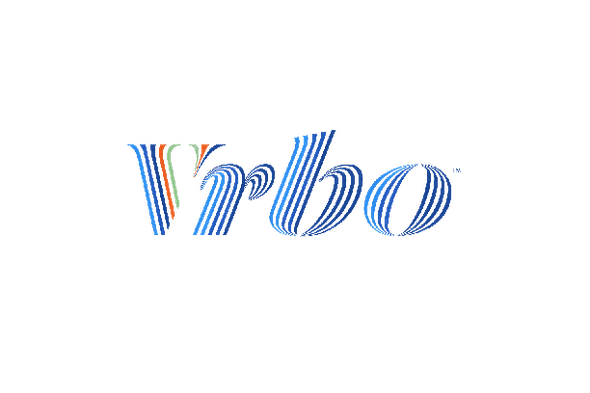
Unlock the Full Potential of Your Vrbo Listing
Harness the power of Vrbo and transform your property into a thriving vacation rental. By adhering to local regulations and Vrbo's detailed listing requirements, you can optimize every aspect of your hosting experience. From creating eye-catching, accurate listings to selecting the right fee structure — whether it's pay-per-booking for occasional rentals or an annual subscription for frequent bookings — every choice you make drives your success.
Step into the world of Vrbo with confidence and elevate your rental to new heights, ensuring a profitable and satisfying venture in the booming vacation rental market.